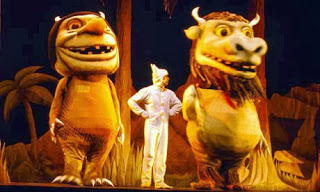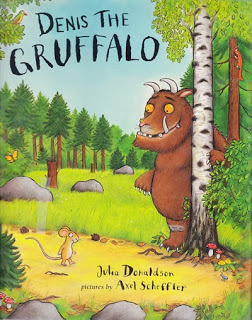Names, or no names. . .
The impact of names in children's books is something that I hadn't thought about particularly until I read an article about the stage version of Maurice Sendak's 'Where The Wild Things Are'.
In the article, Sendak talked about how he felt he couldn't stage direct his creatures until they had defined personalities. To this end he felt they needed to have names. Not overtly in the script, but just as a personal device to help their coming alive as animated beings feel more convincing. Hooks to hang their behavioral characteristics on if you like.

It was interesting that there was felt to be no need for this naming in the actual book, ( or come to think of it, in Sendak's head at the time of writing and drawing it ). Maybe because the creatures weren't differentiated in the book, they were the Wild Things, and didn't need the distraction of having different personalities.
Anyway, that is by the by. What was really fascinating to me, and revealing about my own mental blind spots etc, were the names he chose. I may not have the first one exactly right but you will get the idea. He chose the names Aaron, Moysha and Tzippy.
Because of my lack of examination of my own cultural bias, or awareness that I even had much of one, I was surprised. The surprise was only momentary, But my inner self monitoring process clocked it! I gave myself a clip round the ear. Why on earth should it be even remotely surprising that a jewish author would give his creations jewish names?
On further consideration, I came to the conclusion that it was the baggage that comes with names that had struck me. Suddenly, Sendak's creatures had ethnicity! They were no longer universal creatures from the imagination in quite the same way.
This made me think up all sorts of names for the creatures and see what difference that made to my view of them. What if they were Alf, Bert and Norman, or Rory, Torquil and Hector? What if they were Gudeep, Arshad and Divinda, or Lloyd, Winston and Curtley? etc etc. Or what, heaven forfend, if they were girls? ;-)
It does seem that a seething morass of entirely subjective cultural bias, class bias, and unsubstantiated preconceptions is invoked every time a name is used! (If you can evoke a morass. . . Look, I like mixed metaphors!)
I have been steering clear of names in my own work for a long time without really examining why. It just felt right. It's nice to know that my unconscious was on the ball. . .
I think it is similar to choosing animals as protagonists in your books, as I tend to do. By using animals, you avoid the class, culture, and gender issues that depicting children can stir up. These issues can distract from the story or the point of a book and threaten to spoil it. I find that by using non-names like Baby Owl and Little Puffin as well, I can neatly sidestep these distractions for a second time.
ps - Not that there is anything wrong with names used in the full awareness of their 'baggage'. 'Peter Rabbit' is set in a particular time and place, as is Shirley Hughes 'Alfie' and many others. And they are great. I just can't imagine 'Denis the Gruffalo' working all that well. . .

In the article, Sendak talked about how he felt he couldn't stage direct his creatures until they had defined personalities. To this end he felt they needed to have names. Not overtly in the script, but just as a personal device to help their coming alive as animated beings feel more convincing. Hooks to hang their behavioral characteristics on if you like.

It was interesting that there was felt to be no need for this naming in the actual book, ( or come to think of it, in Sendak's head at the time of writing and drawing it ). Maybe because the creatures weren't differentiated in the book, they were the Wild Things, and didn't need the distraction of having different personalities.
Anyway, that is by the by. What was really fascinating to me, and revealing about my own mental blind spots etc, were the names he chose. I may not have the first one exactly right but you will get the idea. He chose the names Aaron, Moysha and Tzippy.
Because of my lack of examination of my own cultural bias, or awareness that I even had much of one, I was surprised. The surprise was only momentary, But my inner self monitoring process clocked it! I gave myself a clip round the ear. Why on earth should it be even remotely surprising that a jewish author would give his creations jewish names?
On further consideration, I came to the conclusion that it was the baggage that comes with names that had struck me. Suddenly, Sendak's creatures had ethnicity! They were no longer universal creatures from the imagination in quite the same way.
This made me think up all sorts of names for the creatures and see what difference that made to my view of them. What if they were Alf, Bert and Norman, or Rory, Torquil and Hector? What if they were Gudeep, Arshad and Divinda, or Lloyd, Winston and Curtley? etc etc. Or what, heaven forfend, if they were girls? ;-)
It does seem that a seething morass of entirely subjective cultural bias, class bias, and unsubstantiated preconceptions is invoked every time a name is used! (If you can evoke a morass. . . Look, I like mixed metaphors!)
I have been steering clear of names in my own work for a long time without really examining why. It just felt right. It's nice to know that my unconscious was on the ball. . .
I think it is similar to choosing animals as protagonists in your books, as I tend to do. By using animals, you avoid the class, culture, and gender issues that depicting children can stir up. These issues can distract from the story or the point of a book and threaten to spoil it. I find that by using non-names like Baby Owl and Little Puffin as well, I can neatly sidestep these distractions for a second time.
ps - Not that there is anything wrong with names used in the full awareness of their 'baggage'. 'Peter Rabbit' is set in a particular time and place, as is Shirley Hughes 'Alfie' and many others. And they are great. I just can't imagine 'Denis the Gruffalo' working all that well. . .

Published on December 16, 2013 00:42
No comments have been added yet.



